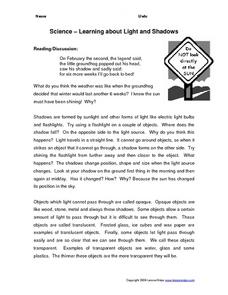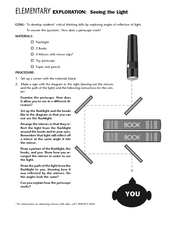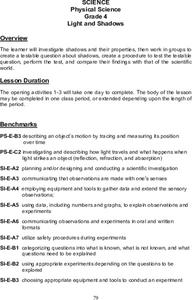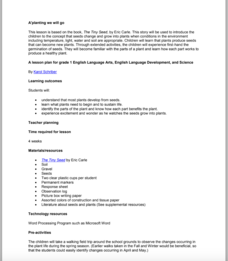National Nanotechnology Infrastructure Network
Understanding Wave Motion - Slinky vs. Snaky: Which Spring is Dominant?
Ride the wave to an understanding of refraction! The first in a series of two inquiry-based lessons challenges learners to create transverse waves with two different types of springs. As their wave hits an object, they observe the change...
Curated OER
Fish Tank Optics: Learning How Light Travels
Students examine light waves and see how they travel. They explain that light moves in waves, which can bounce off of or go through materials. They use a flashlight to shine on a variety of objects.
Curated OER
Light and Vision
In this light and vision worksheet, students will review the characteristics of light including how the eyes use light to see. This worksheet has 9 fill in the blank, 8 true or false, 9 multiple choice, and 1 short answer question.
K12 Reader
Point of View: Who Is Telling the Story?
See how famous books of literature have different perspectives with a short learning exercise. After reviewing the difference between first and third person points of view, learners look over six passages from various novels and...
Curated OER
You Light Up My Life
Third graders participate in various experiments involving light. They demonstrate how light travels in a straight line until it strikes an object. Students show ways that light can be reflected, refracted, and absorbed.
K12 Reader
What Causes Reflections?
Your kids probably use mirrors every day, but do they know how they work? A reading passage about reflection and reflective objects can address both physical science and reading comprehension. Kids read the paragraphs and use context...
Columbus City Schools
Earthly Waves
How did scientists discover what lies beneath the earth's surface? Dig a hole? X-ray vision? Guide your class through the types of seismic waves and how these waves helped shed light on Earth's many layers. The included resources provide...
Curated OER
Seeds! What is Inside; How does it Grow and Why is it Important?
Students discover the importance of seeds in relationship to nature. In this plant growth lesson plan, students create a collection of seeds and discover the best type of environment to plant them. Students plant their own...
Curated OER
Innovation: Light Speed
Get your scholars working at "light speed" with this activity on how different wave frequencies have been discovered and used. The assignment has 20 short-answer questions, set up in a table. Consider re-doing the table or allowing high...
Curated OER
How Do Bats Navigate At Night?
Through an experiment, learners explore how bats use echolocation. First, they discuss how sound travels through air waves. Then, they talk about the ways bats navigate in the dark. As an extension, they can write about what they have...
Curated OER
An Introduction to Light Unit-Third Grade
Third graders are introduced to light in an eight part unit which includes activities, additional resources, and rubrics for each part. Students address topics such as energy, reflection, absorption, and refraction through hands-on...
Curated OER
Light
Students observe how light can be reflected, refracted, and absorbed. In this light lesson, students discover that light travels in a straight path. This lesson contains a "bonus" activity that explains how to make a kaleidoscope.
Curated OER
Distances in Space
In this distances in space worksheet, students learn about astronomical units and light years as measurements for great distances. Students use both of these units of measurements to solve five problems.
World Health Organization
Sun Protection
Primary graders become sun scientists and conduct experiments to learn about the beneficial and harmful effects of the sun and UV radiation. They also investigate their personal sunburn danger zones and learn about how to protect...
Curated OER
Hoe Long Does it Take to Get to a Star
Students calculate the distance in light years. In this geometry lesson, students solve problems involving distance, using the distance formula. They rewrite big numbers using scientific notations and apply their knowledge of everyday...
Curated OER
Science--Learning About Light and Shadows
In this light and shadows worksheet, students find 5 transparent items and 5 opaque items from the classroom and categorize them underneath their appropriate headings. Students look at 4 boxes with shadows and draw a little sun to show...
PHET
Band Structure
Electricity travels at the speed of light, 186,000 miles per second. Through a simulation, classes see how the structure of energy bands in crystals of atoms determines how materials conduct electricity. Participants can change the...
Curated OER
Elementary Exploration: Seeing the Light
Students use critical thinking skills to learn about light, sound, and matter. Students follow the procedure steps to complete a light, sound, and matter experiment.
Discovery Education
Sonar & Echolocation
A well-designed, comprehensive, and attractive slide show supports direct instruction on how sonar and echolocation work. Contained within the slides are links to interactive websites and instructions for using apps on a mobile device to...
Curated OER
Light And Shadows
Fourth graders explore the properties of shadows. In pairs they trace each other's shadows in chalk and re-draw their shadow outlines every three hours, design their own shadow investigation, and complete various worksheets related to...
Curated OER
No Shadow of Doubt
Fifth graders must use a pencil to draw in the shadows they think will be formed by a house, a greenhouse, and a tree. The sun is behind each of these objects, and an open field is in front of them. That's where pupils draw their...
Curated OER
A'planting We will Go
Germination is an amazing process that results in amazing things. The book The Tiny Seed is the inspiration for a set of activities that will help build early literacy, observation, language, and writing skills. The class observes how...
Curated OER
Velocity and Acceleration
In this velocity and acceleration worksheet, students determine the distance walked and the displacement of a person who walks 15 m west and 20 m east. Then they determine the resultant velocity of a bicyclist who rides 10 km/h west and...
Curated OER
Fast Fact-Finding
Ever wonder why the sky changes color so often? Readers examine an informational excerpt from John Farndon's How the Earth Works. They underline key points as they read and then answer five response questions. Prompts review main...

























